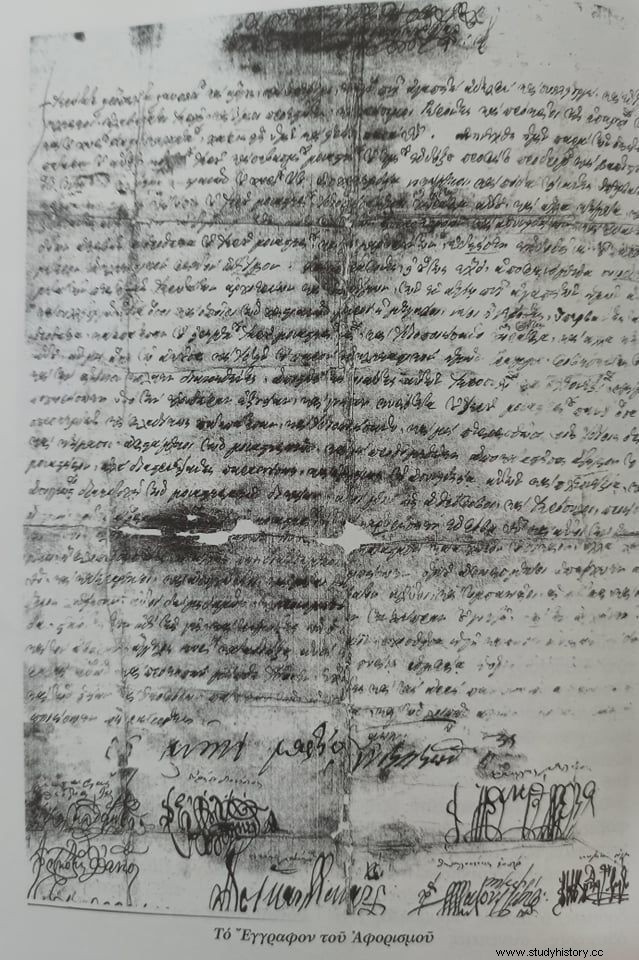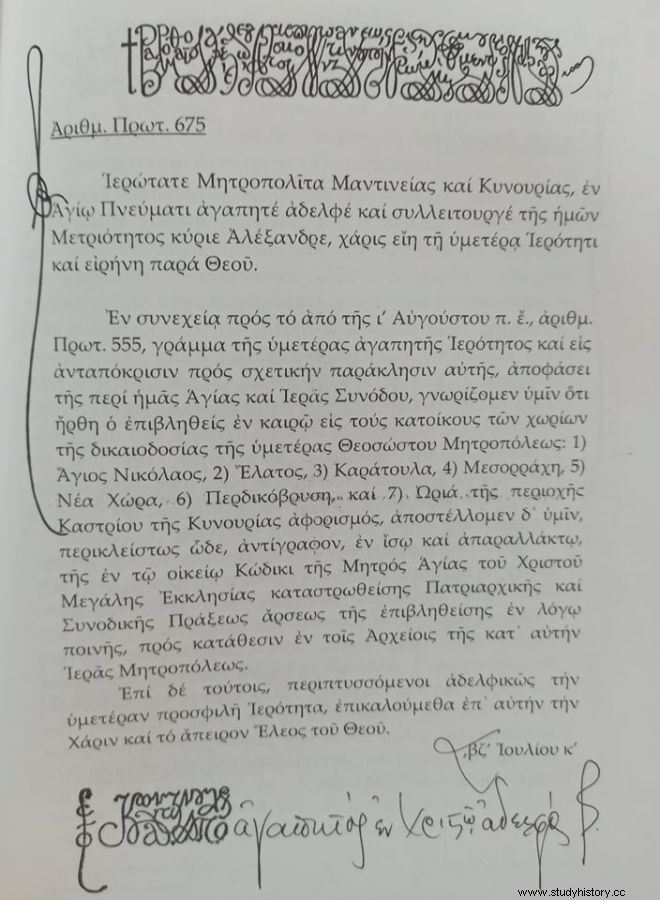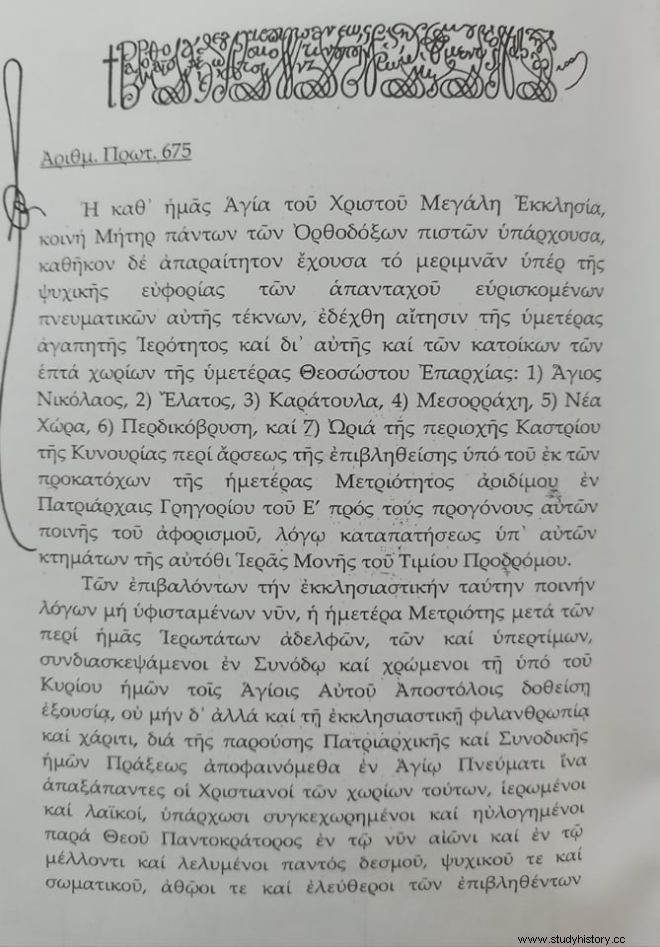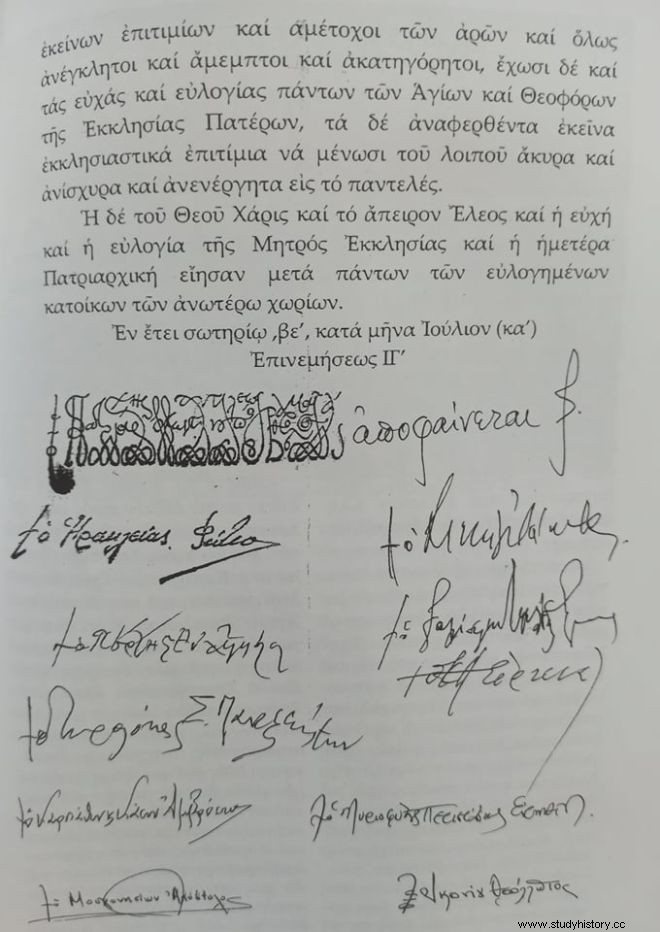About two months ago, a citizens' initiative came to bring to the fore an issue that is directly related to the celebrations for the 200th anniversary of the start of the Greek Revolution of 1821.
The Movement of Greek Citizens for the Secularization of the State (KEPEK) has again put on the table of discussions, the question of the excommunication of the Greek Revolutionaries and the Friendly Society by the Patriarch of Constantinople, Gregory V, which took place in 1821, affecting the general a role that the Church played in the pre-revolutionary years but also during the Struggle.
In relation to the role of the highest hierarchy of the Church, the new study of the "Lux Orbis" series entitled "The Black Book of 1821", which, among other things, sheds light on whether the excommunication of Gregory V was finally restored, as claimed by Church of Greece.
It is noted here that indeed, the burden of lifting the excommunication falls on the Patriarchate of Constantinople, however, at the time of the Revolution, the Hellenic Church and the Patriarchate were identical.
Following the above, the metropolis of Piraeus voluntarily sent a response to KEPEK, in which it states that the excommunication of 1821 was a "diplomatic maneuver, to save thousands of civilians from the merciless massacres of the enraged Turks". Furthermore, he mentions that this "virtual" excommunication "came in a secret ceremony of the Patriarch and the Synodal Hierarchs, on April 10, 1821, a few hours before the martyrdom end" of Gregory.
To the above, KEPEK responds in its turn, that the action of the Patriarchate of Constantinople, from 1798 to 1828, was clearly opposed to the Greek Enlighteners and their efforts, while it characterizes as "anti-national" the role of the highest hierarchy of the Church during the pre-revolutionary years.
The interesting thing here is that the Movement of Greek Citizens for the Secularization of the State also brings to the fore a not so well known excommunication, that of 1819, when Gregory V, during his third term as patriarch, attacked residents of seven villages around the Kastri region of Kynouria.
In fact, in 2005, the metropolis of Mantineia and Kynouria carried out a historic restoration by Metropolitan Alexandrou, who symbolically tore the manuscript of the aphorism of Gregory. The metropolitan had previously made a request to the patriarchate and had received a positive response. In fact, the video documentary can be seen below, and is published for the first time by NEWS 24/7 .
Following this, KEPEK asks the highest Hierarchy of the country to proceed with a similar move of high symbolism, which they say could close historical issues of the past that remain in a dark area. Always on the occasion of the 200th anniversary of the start of the Race.
KEPEK's announcement in detail
"Once again, as KEPEK, we are pleased to enter into the process of a unique dialogue with the "Office on Sects and Para-Religions" of the Piraeus metropolis. Pleasant, because in this way we manage to keep the dialogue open with representatives of the Greek Orthodox Church, exchanging thoughts, opinions and arguments. In this way, Greek citizens can make better judgments, leading to safer conclusions on the topics under discussion that are raised each time.
Thus, after the response (Oct. 2020) of the "Office" to an interview (Sept. 2020) of our members and the new positioning of KEPEK at the end of last October, we enter a new chapter of dialogue on the subject of the Aphorism of the Revolution of 1821 from Gregory V and the need to remove him from the patriarchate of Kon/polis and the Holy Synod of the Church of Greece today.
The reason for the opening of the debate was the announcement of KEPEK and the related resolution it issued at the end of January. In said announcement, among others, the following were mentioned:"Through this letter/resolution, we call on the Holy Synod of the Church of Greece and the Holy Synod of the Patriarchate of Constantinople to lift the excommunication of the Greek Revolution, contributing significantly to limiting the division of Greek society in view of the anniversary celebrations of 1821. We recognize that the burden of lifting the excommunication falls on the Patriarchate of Constantinople, but we must not forget that at that time there was no autocephalous, so the Greek Church and the Patriarchate were one and the same . In addition, the Hellenic Church still uses the figure of Gregory V as an ethnomartyr to this day. One can agree or disagree with this stance. However, its representatives have the possibility to "cleanse" the black stain of his personality, through the lifting of the excommunication of the revolutionaries or even through a public appeal to the Patriarchate of Constantinople, in this direction ".
About a month later, at the beginning of March, the "Office on Sects and Parareligions" of the Piraeus metropolis responded to our request with this text.
We will not dwell so much on the reproduction of the so-called "National Myths", such as Saint Lavra and the hidden school, which largely characterized the post-revolutionary attempt of the Church to gradually win the trust of the Greeks regarding its role in the pre-revolutionary and revolutionary years. The foregoing have been adequately answered in the past and are commented on even today by our academic historians.
We note the new attempt of the Piraeus metropolis to downgrade the role of the Greek Enlighteners , of those people who pre-revolutionarily constituted the intellectual locomotive of the Revolution, being persecuted in various ways for their positions by the patriarchate and the other conservative circles of the Greek space. This tactic is clearly not accidental. The preparation for '21 does not only concern the war preparations and the secret agreements for the start of the Struggle, but also the fierce dispute between Greek Enlighteners and Christian Scholars over the issues of education reforms. It is, after all, typical of what Archimandrite Irenaios Delidemos mentions in the preface to the Helm of Nicodemus of Agioreitis in 1864:"If the dreams of the followers of the Enlightenment were fully realized in Russia and the countries of the Ottoman Empire, the Orthodox peoples they would emerge from the sorrowful state of ignorance, they would enter the bright path of progress, they would love the sciences and the power of right reason, they would be cut off socially and economically, but at the same time they would be cut off from their roots and instead of Orthodox spirituality, which springs from of man's humiliation before the love of God, the arrogant self-confidence of the human mind will prevail over them too s". Even the most ignorant person understands why the Enlightenment was slandered and is still slandered in our country. And of course he better understands the reasons why as a state we have stagnated intellectually, productively and to a large extent intellectually, compared to other states in the West.
Regarding the division of Greek society due to the Church not lifting the excommunication, here the authors of the answer given by the "Office", do not understand or probably act as if they do not understand what exactly we said. In our text we did not refer to the division of the Greeks of '21 over the attitude of the highest Hierarchs towards the concepts of freedom and independence. It goes without saying that there was a division in those years as well (a striking example is the competition of the Bee that we revived this year, but also the texts of all the Enlightenment publications of the time), but to expand on such a topic here would require pages upon pages of analysis and citation of evidence . In our resolution we referred to the Greek society of 2021, which is strongly divided (on and off the internet) regarding the issue of the attitude of the highest leadership of the Church towards the Revolution. Most likely in the Piraeus metropolis they have lost touch with society, and this is the reason they do not realize that a possible lifting of the excommunication on the part of the Hellenic Church or the patriarchate would at least benefit their leadership in terms of communication.
In their text, the editors of the metropolis of Piraeus overemphasize the well-worn argument that the excommunication of the Revolution by Gregory V was a "virtual" excommunication that prevented the massacres of Greek populations in the City. But the previous is nothing more than a "convenient" truth. Indeed, if one closely sees the events through the prism of March 1821, one is "righted" to be led to such a conclusion. But the anti-revolutionary action of the patriarchate and especially of Gregory V (a man of the Ottomans, who was placed three times in the position of patriarch) leave no room for misinterpretation. The recent edition (March 2021) of the book "The Black Book of 1821" (published by iWrite - Lux Orbis Series) presents for the Greek public a series of original texts and circulars of the Patriarchate of Constantinople, from 1798 to 1828. Reading one understands beyond any doubt the anti-national role of the highest hierarchy of the Church during the pre-revolutionary years. Unfortunately or fortunately, we live in times where the truth is very difficult to keep hidden.
And we come to yet another case of falsification of History, which this year made its appearance through a televised interview of the archbishop and continues in the letter of the Piraeus metropolis. This is none other than the alleged lifting of the excommunication that Gregory did in... a secret ceremony in the basement of the patriarchate, a few days before he was led to the firing squad. This fact is an ecclesiastical myth made up in the middle of the 19th century (in the first recorded books, the event is characterized as "ecclesiastical tradition") and is not supported by any official or unofficial patriarchal document. But that's not all. Encyclicals of post-Gregory V patriarchs, such as Eugene II in August 1821 or Agathangelos in 1828 (both texts are included in the aforementioned and newly printed work, "The Black Book of 1821"), which call on the Greeks to return in the arms of the Sultan, they promise the penitents the lifting of Gregory's excommunication. How, then, is it possible to promise the lifting of an excommunication which is supposed to have already been rescinded? Thus this argument is definitively and irrevocably rejected.
And we now turn to possibly the most interesting aspect of the case we are considering here. In the response recently given to us by the Office of the Piraeus metropolis, we were particularly impressed from the first moment by the way in which its authors chose to close their letter:"We hope that both the Church of Greece and the Ecumenical Patriarchate, will not fall into the deceitful trap of the Christian fighters, to raise the issue of lifting, or not, the "excommunication", because it is clear that this proposal has only one goal:to hurt the Church and not to restore the historical truth and to remove the supposed, non-existent division of our fellow citizens"!
On the day we published the letter in question on our page, we mockingly commented that in the Piraeus metropolis it seems that they do not trust their colleagues from the Holy Synod and the Patriarchate, publicly expressing such an admonition. But in the meantime we discovered something that might fully justify their concern.
In 1819 and during his third term as patriarch, Gregory V proceeded to an excommunication unknown to most modern Greeks.
His... curses concern the inhabitants of seven villages around the Kastri region of Kynouria. The impoverished ragiades of the area decide to encroach on the lands of the neighboring Prodromou Monastery, which forces the then Metropolitan of Argos, Ierotheos, to appeal to the patriarchate. Grigorios curses the inhabitants of the surrounding villages, but also their future descendants, achieving his goal. It sows terror and fear in living and future generations.

Year 2005. The metropolis of Mantineia and Kynouria, to which the aforementioned area now belongs administratively, is under pressure from the residents for a historical restoration. Metropolitan Alexander makes the big decision. He sends a letter to the Patriarchate of Constantinople requesting the removal of the excommunication from the Synod. The answer is affirmative. The patriarchate responds with conciliar forgiveness documents, which are actually read in a solemn event at the Prodromos Monastery, where Metropolitan Alexander literally and symbolically tears up the manuscript of Gregory's excommunication.
The following are the revelatory texts sent by the patriarchate, exactly as they were published in the magazine "Alievs" of the metropolis of Kynouria and Mantineia (no. p. 250, April-June 2008):
Holy Metropolitan of Mantineia and Kynouria, in the Holy Spirit, dear brother and co-minister of our Modesty, Mr. Alexander, by the grace of your great Priesthood and peace from God.
Continuing to the letter of the 7th of August BC, No. Prot. 555, letter of your very dear Priesthood and in response to its relative prayer, according to the decision of the Holy and Holy Synod concerning us, we know that the imposed in time to the inhabitants of the villages under the jurisdiction of the Metropolitan of Theosos:1) Agios Nikolaos, 2) Elatos, 3) Karatula, 4) Mesorrachis, 5) Nea Chora, 6) Perdikovrysi and 7) Oria of the Kastri region of Kynouria, excommunicated , we are sending you, enclosed herewith, a copy, identical and unaltered, of the Patriarchal and Synodal Act of lifting the said penalty established in the relevant Code of the Holy Mother of Christ the Great Church, to be deposited in the Archives of the said Holy Metropolis.
Nevertheless, fraternally embracing the beloved Holiness hereafter, we call upon this Grace and the infinite Mercy of God.
Bz' July k'
No. Prot. 675
Our Holy Great Church of Christ, common Mother of all the Orthodox believers existing, and having a necessary duty to care for the mental euphoria of her spiritual children everywhere, accepted the request of your beloved Priesthood and through her and the residents of the seven villages of the ymeter Theosostos District:1) Agios Nikolaos, 2) Elatos, 3) Karatula, 4) Mesorrahi, 5) Nea Chora, 6) Perdikovrysi and 7) Oria of the Kastri area of Kynouria regarding the lifting of the imposed under the of the predecessors of the present Modesty of Aedimus in Patriarch Gregory V' to their ancestors the penalty of excommunication, due to encroachment on the properties of the same Holy Monastery of the Holy Prodromos.
To those who imposed this ecclesiastical punishment for reasons that do not exist now, the Mother of Moderation after the Priestly brothers about us, the most honorable ones, discussing together in Synod and wearing the authority given by our Lord to His Holy Apostles, do not see but and ecclesiastical philanthropy and grace, through our present Patriarchal and Synodal Act we declare in the Holy Spirit that the Christians of these villages, consecrated and lay, may be blessed and blessed by God Almighty in the present age and in the future and be freed from every bond , mental and physical, innocent and free of those penalties imposed and not partakers of the virtues and completely blameless and blameless and unaccused, and having the wishes and blessings of all the Holy and God-bearing Fathers of the Church, and those mentioned ecclesiastical penalties to remain of the rest void and powerless and inactive in its entirety.
The Grace of God and the infinite Mercy and the blessing and the blessing of the Mother Church and the Holy Patriarchate were after all the blessed inhabitants of the above villages.
In this year I save, b', by month July (m')
Epinimesis ΓΓ'



The die is cast. An excommunication is lifted on the initiative of a metropolitan of the Church of Greece and a decision of the Patriarchate of Constantinople. Ερωτούμε:Τι το διαφορετικό ζήτησε το ΚΕΠΕΚ μέσω του αιτήματός του προς την Εκκλησία της Ελλάδος και το πατριαρχείο Κωνσταντινουπόλεως; Η αποκάλυψη του παραπάνω γεγονότος αποδεικνύει πέραν πάσης αμφιβολίας ότι υπάρχει προηγούμενο, που έχει, μάλιστα, λάβει χώρα μόλις 16 χρόνια πριν, εντός του 21ου αιώνα. Έχουμε ένα παράδειγμα άρσης αφορισμού (συμπτωματικά και αυτός από τον Γρηγόριο Ε'), απέναντι σε κατοίκους του ελλαδικού χώρου, που ακυρώνεται δύο αιώνες αργότερα ύστερα από συνεννόηση μητροπολίτη της Εκκλησίας της Ελλάδος με τη Σύνοδο του πατριαρχείου. Σύμφωνα με τη λογική του Γραφείου της μητρόπολης Πειραιά, η Εκκλησία της Ελλάδος θα πρεπε να έχει υποστεί βαρύτατο πλήγμα από αυτή την πρωτοβουλία του μέλους της. Είναι, όμως, έτσι τα πράγματα;
Αδυνατούμε να κατανοήσουμε για ποιον λόγο η άρση του αφορισμού των επαναστατημένων Ελλήνων από τον Γρηγόριο Ε' αποτελεί ένα ζήτημα που απαγορεύεται να μπει στο τραπέζι της Δημόσιας Σφαίρας, με αφορμή τη συμπλήρωση 200 ετών από την έναρξη του Αγώνα. Δικαίως, λοιπόν, ανησυχεί ο κ. Σεραφείμ, όμως για άλλους λόγους από αυτούς που προβάλλει. Τον ενδιαφέρει να μην ανακινείται δημοσίως το θέμα του αφορισμού της Επανάστασης από την Ηγεσία της Εκκλησίας (καθώς επίσης και η γενικότερη στάση της κατά τα προεπαναστικά και επαναστατικά χρόνια) και μάλιστα σε μία τέτοια χρονική στιγμή. Τον καταλαβαίνουμε, πλέον, απόλυτα. Παρόλα αυτά μία από τις παρακαταθήκες που αφήνει το '21 στις νεότερες γενιές είναι και η ρήση “Εθνικό είναι μόνο το αληθές”.
ΚΕΠΕΚ – Κίνηση Ελλήνων Πολιτών για την Εκκοσμίκευση του Κράτους".
Ακολουθήστε το News247.gr on Google News and learn all the first news
